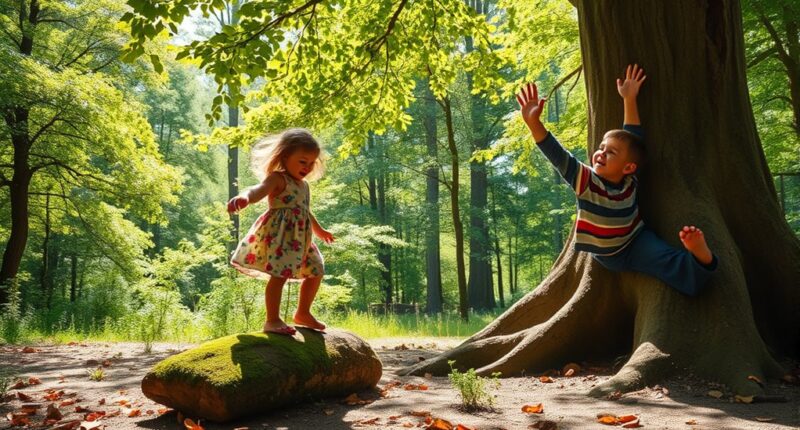Outdoor play boosts your child’s development by supporting their physical, cognitive, emotional, and social growth. It encourages curiosity about nature, sharpens observation skills, and promotes creativity through exploration. Active outdoor time improves muscle strength, coordination, and overall health while reducing stress and anxiety. It also helps children develop independence and social skills as they interact with others in natural settings. Keep exploring to discover more ways outdoor activities foster a well-rounded, healthy childhood.
Key Takeaways
- Outdoor time boosts physical health by improving motor skills, coordination, and vitamin D levels.
- Nature play enhances cognitive development through exploration, problem-solving, and critical thinking.
- Engaging with natural environments reduces stress, promotes emotional well-being, and fosters calmness.
- Playing outdoors develops social skills and independence through teamwork and self-directed activities.
- Experiencing nature nurtures curiosity, creativity, and a deeper understanding of ecosystems and science.

Have you ever wondered how spending time outdoors can boost your child’s development? When your child ventures outside, they’re not just playing—they’re engaging in vital activities that shape their growth in many ways. One of the most exciting aspects of outdoor play is wildlife exploration. As your child observes birds, insects, and small animals, they develop a natural curiosity about the world around them. This exploration encourages critical thinking, patience, and observation skills. By pointing out a squirrel or a butterfly, you help them learn about different species and ecosystems, fostering an early appreciation for nature and science.
Outdoor exploration sparks curiosity, critical thinking, and appreciation for nature in children.
In addition to wildlife, outdoor play offers a wealth of opportunities for sensory activities. When kids touch leaves, feel the bark of trees, or splash in puddles, they activate their senses in ways that indoor environments can’t replicate. These sensory activities help strengthen neural connections, which are essential for cognitive development, language skills, and emotional regulation. For example, running their fingers through soil introduces them to different textures while also encouraging fine motor skills. Jumping in mud puddles can boost their balance and coordination. These hands-on experiences are not only fun but also crucial for their overall sensory processing ability.
Spending time outdoors also greatly benefits your child’s physical health. Running, climbing, and exploring naturally promote gross motor skills, muscle strength, and coordination. The varied terrain of parks, forests, or even your backyard challenges them to adapt their movements, which enhances their spatial awareness and balance. This active engagement reduces the risk of childhood obesity and instills healthy habits early on. Furthermore, outdoor play exposes children to sunlight, which helps their bodies produce vitamin D—essential for bone health and immune function. Proper vacuum cleaner performance during indoor cleaning can help maintain a healthy environment free of dust and allergens that might affect their respiratory health.
Beyond the physical and cognitive benefits, outdoor time nurtures emotional well-being. When your child is surrounded by nature, they often feel calmer and more focused. The natural environment reduces stress and anxiety and fosters creativity and problem-solving skills. They learn resilience when navigating uneven ground or climbing trees, and they develop independence when making discoveries on their own. These experiences also promote social skills if they play with others, encouraging teamwork and communication.
Frequently Asked Questions
How Much Outdoor Time Is Optimal for Children’s Development?
You should aim for a balanced schedule that includes plenty of outdoor time suited to your child’s age. Experts recommend children spend at least an hour daily engaging in age-appropriate activities outside. This guarantees they develop physically, socially, and emotionally. Adjust the outdoor duration as your child grows, always prioritizing fun and safety. Consistent outdoor play fosters curiosity, resilience, and health, making it an essential part of their overall development.
Are There Safety Concerns With Unstructured Outdoor Play?
You might wonder if unstructured outdoor play poses safety concerns. While it can be beneficial, making certain to follow supervision guidelines and ensure equipment safety is crucial. Keep a close eye on children, set clear boundaries, and regularly check outdoor equipment for hazards. By doing so, you allow kids to explore freely while minimizing risks, helping them develop confidence and independence safely during their outdoor adventures.
How Can Parents Encourage Outdoor Play in Urban Environments?
You can encourage outdoor play in urban environments by taking advantage of nearby urban parks, which provide safe spaces for kids to explore. Get involved in community programs that organize outdoor activities or create playgroups. By regularly visiting parks and joining local initiatives, you help your child develop confidence and social skills while enjoying nature. Making outdoor play a routine fosters curiosity and overall well-being, even in city settings.
What Are the Long-Term Benefits of Outdoor Activities?
You’ll build nature resilience, boost outdoor creativity, and foster problem-solving skills through regular outdoor activities. Long-term, these experiences help children develop confidence, adaptability, and a sense of curiosity. They learn to appreciate the environment, stay active, and manage stress better. By engaging with nature consistently, you set the foundation for healthier habits, stronger social skills, and a lifelong love for exploration—benefits that truly shape their future well-being and growth.
How Does Outdoor Play Influence Children’s Mental Health?
You might notice that outdoor play boosts children’s mental health by strengthening their nature connection and building emotional resilience. When kids explore outside, they experience reduced stress, improved mood, and better coping skills. Their active engagement with nature helps them develop a sense of calm and confidence, making it easier to handle challenges. So, encouraging outdoor play is a powerful way to support their emotional well-being and overall mental health.
Conclusion
You might think indoor activities are enough, but outdoor play truly boosts your child’s development. It’s not just about fun; it helps build their confidence, creativity, and resilience. Yes, outdoor time requires effort, but the benefits far outweigh the challenges. By prioritizing nature play, you’re giving your child essential tools for growth and happiness. Don’t let the busy world keep you indoors—step outside and watch your child thrive in the fresh air.









